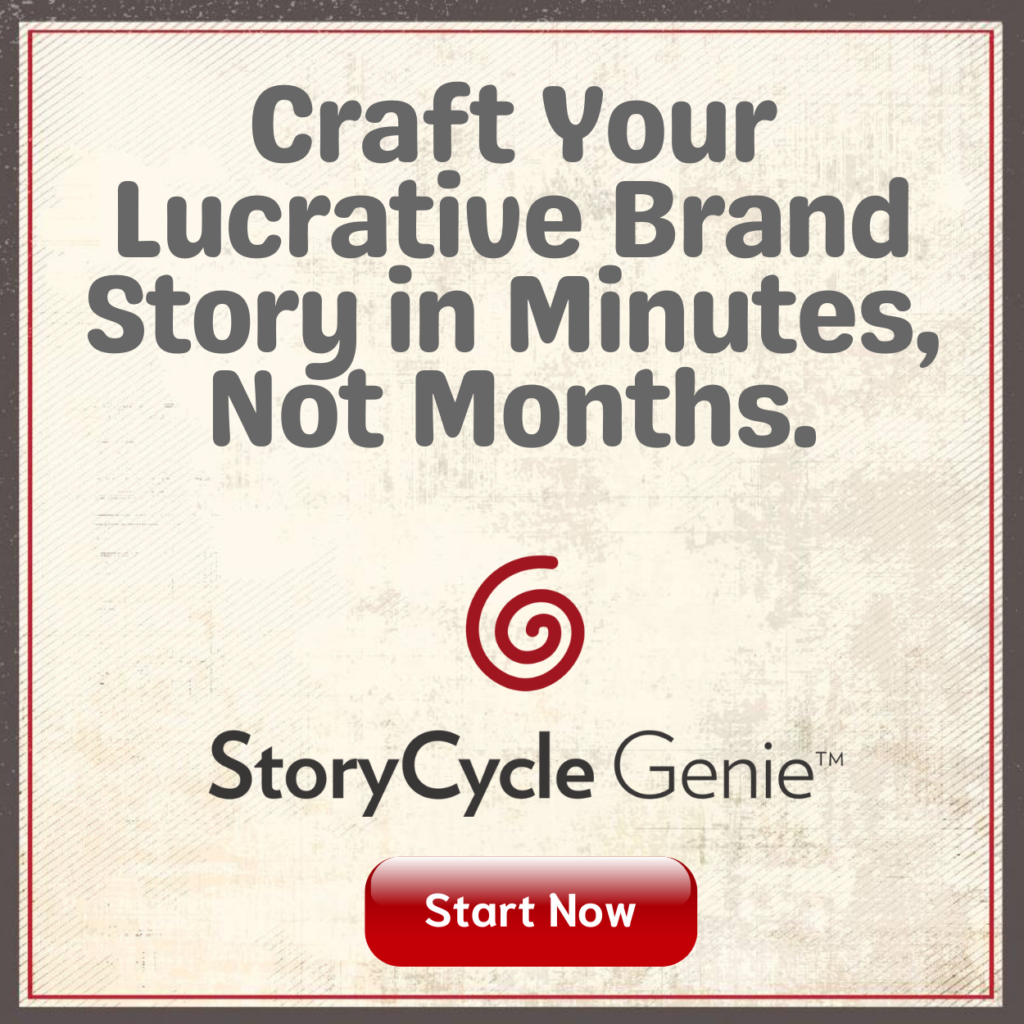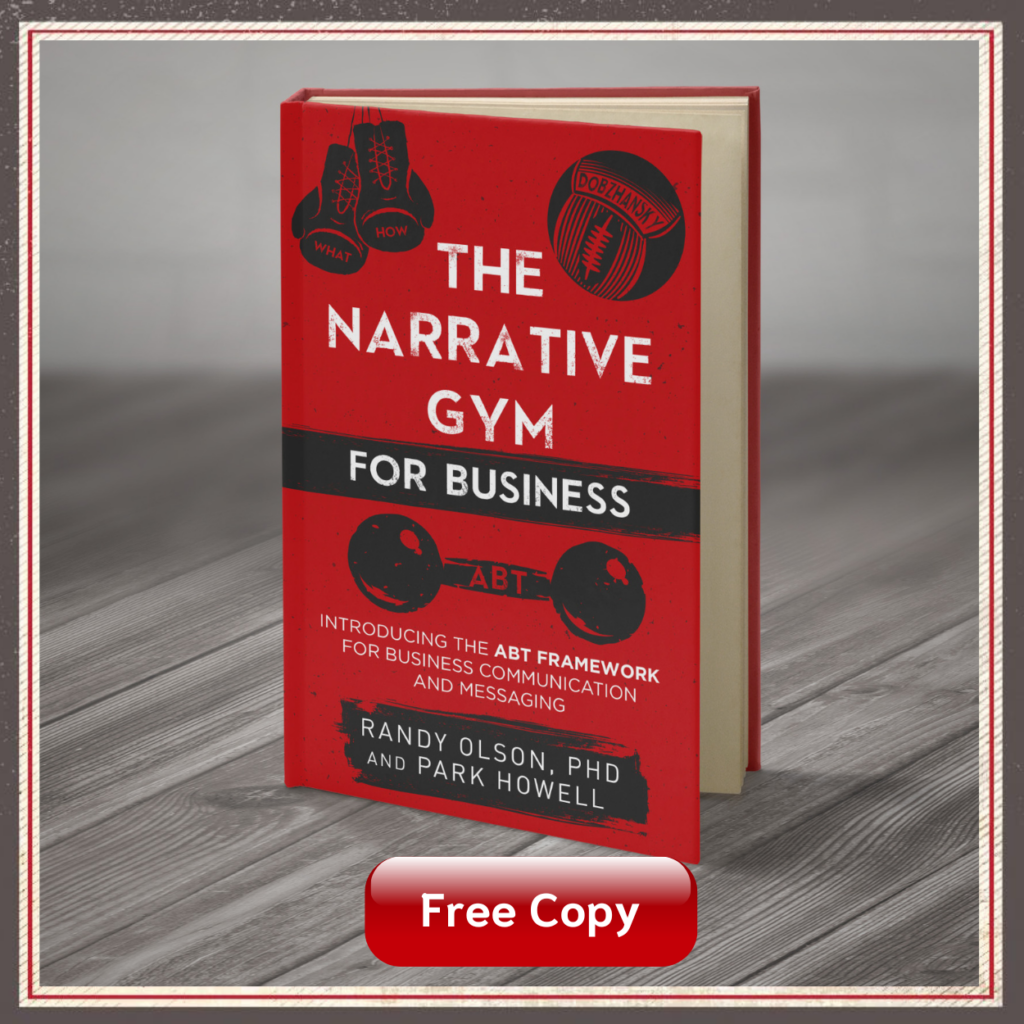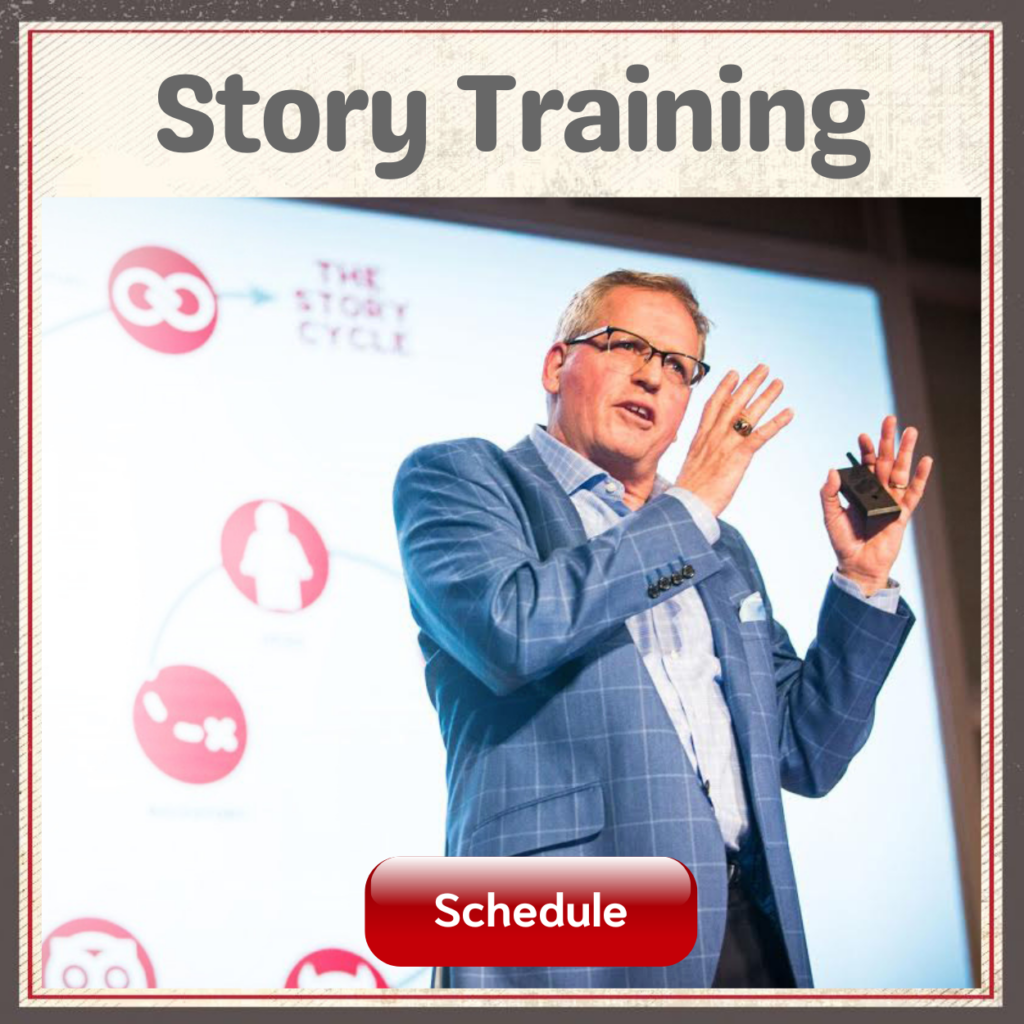The Five Essential Elements (the H.E.A.R.T.) of the Perfect Pitch With Ben Wiener
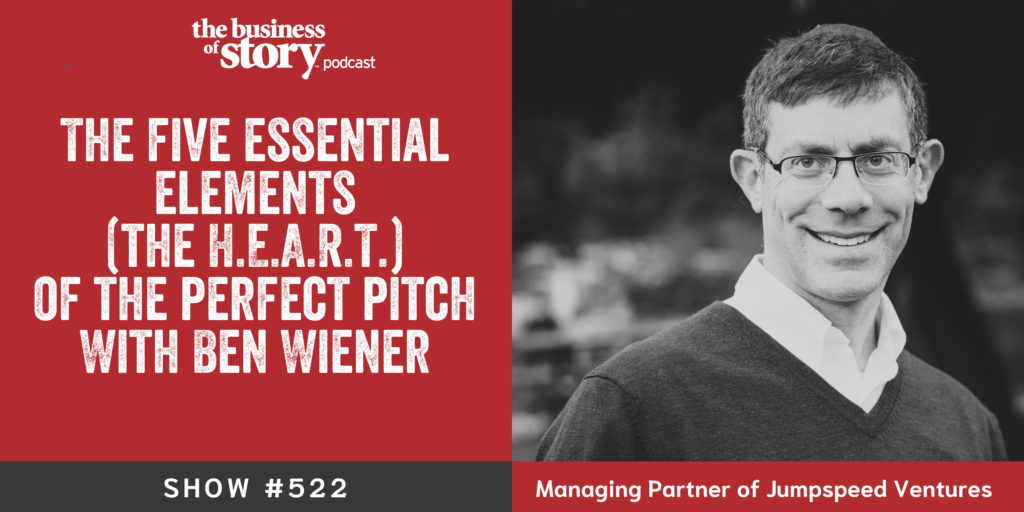
How to Pitch Like Your Life Depends on It
Want to create a winning startup pitch that actually lands funding?
In this episode of the Business of Story, storytelling strategist Park Howell interviews Ben Wiener, managing partner at Jumpspeed Ventures and author of the Amazon #1 bestseller Fever Pitch, a business thriller that brings pitch storytelling to life.
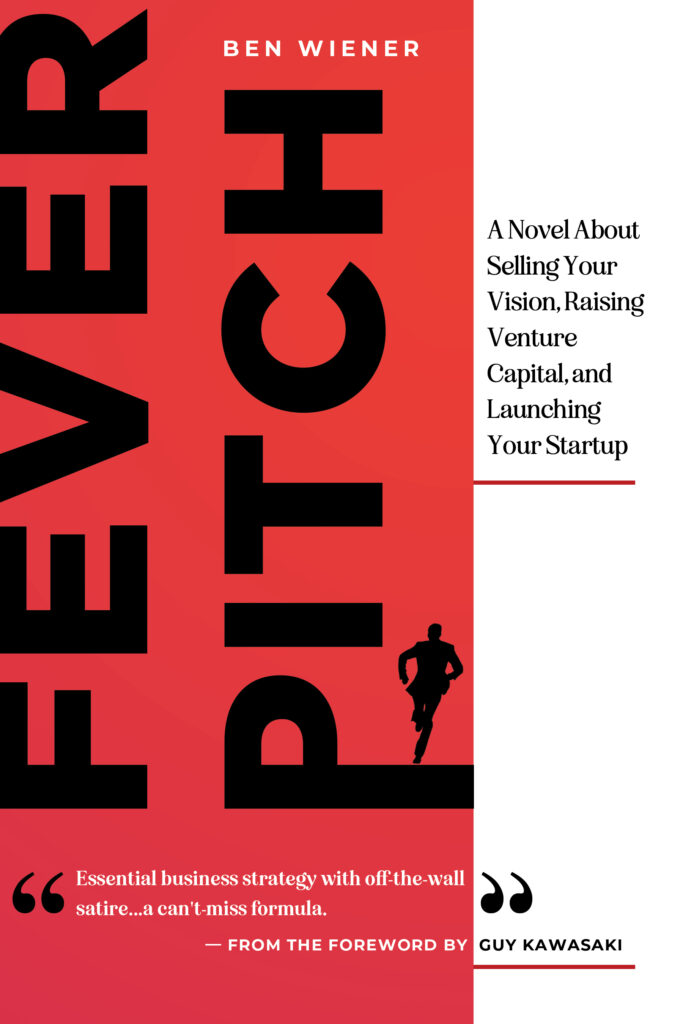
Ben is a venture capitalist, founder, and startup mentor who developed the H.E.A.R.T. Pitch Framework to help entrepreneurs tell stories that inspire action. Learn how to combine emotional resonance, narrative structure, and investor psychology into a simple five-part formula for communicating big ideas.
Whether you’re raising capital, launching a product, or convincing stakeholders, this episode will show you how to structure your pitch like a compelling story and radically improve your odds of success.
Ben is the managing partner of Jumpspeed Ventures, an early-stage venture capital fund focused on category-defining technology startups in Jerusalem.
A former founder himself, Ben turned his hard-won lessons from rejection into the H.E.A.R.T. framework, now taught at institutions such as Harvard and Johns Hopkins.
He’s the author of the business-fiction novel Fever Pitch, which delivers storytelling-driven startup lessons through a suspenseful, music-laced narrative. Ben reads up to 100 books a year, has completed 10 marathons, and believes the best pitches start with why.
What’s In It For You:
- Why 82% of startup pitches fail and how to fix yours with storytelling
- The 5 steps of the H.E.A.R.T. Pitch Framework:
-
-
-
Hypothesis – Start with a belief, not a product
-
Enormous Stakes – Show what’s at risk if things don’t change
-
Alternatives – Expose the flaws of the status quo
-
Radically Different Solution – Make your idea un-ignorable
-
Team – Prove your unique ability to deliver
-
-
- How Fever Pitch uses fiction to teach real-world pitching strategy
- How Ben turned 27 rejections into a top-performing VC fund
- Why the future of pitching is built on timeless storytelling principles
Chapters:
- 00:00 Introduction to Ben Wiener and Fever Pitch
- 04:44 The HEART Framework for Pitching
- 06:33 The Narrative Structure of Fever Pitch
- 10:40 The Journey of a Startup Founder
- 14:12 Common Pitching Mistakes and Fixes
- 23:22 The HEART Framework Explained
- 25:08 The Need for Radical Differentiation
- 28:21 Empowering Founders with the H.E.A.R.T Framework
- 33:03 Crafting a Compelling Brand Story
- 37:48 The Impact of the H.A.R.T Framework
- 40:33 Fever Pitch: A Journey to Success
- 46:05 Local Focus with Global Reach
Links:
- Fever Pitch book
- BenWeiner.net
- Ben Weiner on LinkedIn
- Ben on Instagram
- Ben on Facebook
- StoryCycle Genie™
Popular Related Episodes You’ll Love:
- How to Tell Your Startup Lifecycle Story to Sell Investors & Customers on Your Brand With Gregory Shepard
- How to Use Brand Storytelling to Ignite Your Startup With Sonny Patel
- How to Make Your Sales Story Land Right the First Time With Melissa Kwan
Your Storytelling Resources:
Connect with me:
Instagram: https://www.instagram.com/parkhowell/
Facebook: https://www.facebook.com/groups/BusinessOfStory
YouTube: https://www.youtube.com/channel/UC0ssjBuBiQjG9PHRgq4Fu6A
Twitter: https://twitter.com/ParkHowell
LinkedIn: https://www.linkedin.com/in/parkhowell/
Website: https://businessofstory.com/abt/
Transcript of Show:
Business of Story Interview with Ben Wiener
Park Howell:
Good evening, Ben. Welcome to the show.
Ben Wiener:
Thank you for having me. I’m a big fan of your work and glad to be on the show.
Park:
Well, thank you. It’s actually morning here in Arizona, but I know it’s evening there in Jerusalem. It’s great to have you. I love bringing in story artists from around the world, and I’m pumped to talk about your new book today.
Ben:
Thanks for having me. I can’t think of a better-titled podcast for this topic. Really looking forward to it.
Park:
I love your approach in Fever Pitch—you share your business and startup wisdom through a fictional tale. I’m curious, how much is fact, and how much is fiction?
Ben:
Very little is based on actual events. Only one character is loosely based on someone I met once. The rest is made up. It’s a fable, a teaching tool to communicate the principles of the ideal startup pitch.
Park:
It reminds me of The Go-Giver series—teaching through storytelling. To give our audience some background, I ran your brand through the Story Cycle Genie, and here’s what it pulled: Ben Wiener positions himself as a multifaceted professional who combines venture capital expertise with intellectual curiosity and athletic discipline. You’re a voracious reader, reportedly reading 100 books annually, and a 10-time marathoner living in Jerusalem. Jumpspeed Ventures is a highly selective VC fund focused on Jerusalem startups, with clear investment criteria: Pain, Paucity, Paradigm shift, People, and Passion. Does that sound accurate?
Ben:
Honestly, I was blown away by that report. It captured how I try to position myself—even surfacing a few things I didn’t expect. It was spooky good.
Park:
Spooky, but in the best way! And it’s great timing to have you on because we’re in startup mode too. Your book couldn’t have come at a better time. So what will a businessperson—whether launching a startup or a new initiative—learn from Fever Pitch?
Ben:
The book is one output of years of research on how to present new, innovative ideas in a way that causes people to take action. One of the outcomes of that research was the H.E.A.R.T. Framework for pitching. I wrapped that framework into a fictional story—a founder who literally has to pitch his startup to save his life. Instead of writing a 2,000-word blog post, I wrote a 270-page novel to teach the same concepts.
You don’t have to read the novel to learn the H.E.A.R.T. Framework—you can get it on the website—but the story adds entertainment and layers of insight into startup life and the founder’s journey.
Park:
What’s the overarching story framework in the book?
Ben:
Many fictional startup books feel cartoonish. I wanted a more realistic, high-stakes journey—like what I’ve lived and seen. The protagonist is passionate but doesn’t know how to communicate with investors. His whole life starts falling apart, and the mafia gets involved. The story is extreme but fun. At the dark night of the soul—when he’s in jail—he finally discovers the H.E.A.R.T. Framework.
Park:
And that mirrors your own journey, yes?
Ben:
Exactly. I was broke, unemployed, with no track record. I had a contrarian idea for a VC fund in Jerusalem. I was rejected 27 times. Then one investor stood up in a coffee shop and said, “This is the most ridiculous pitch I’ve ever heard. Go get a job.” That forced me to rethink everything. Same idea, same me—but I restructured the pitch. It landed. That fund is now a top decile performer for its vintage year.
Park:
So your story was off pitch, literally. You must have thought about giving up.
Ben:
Never. I doubted my delivery, not the opportunity. I needed to reframe it. That led to the H.E.A.R.T. Framework.
Park:
Can you give us the A/B comparison of your old pitch versus the improved version?
Ben:
Absolutely. The old version started with what I do—like most founders do. “I run a VC fund, we do this and this…” That’s wrong. Simon Sinek nailed it: you must start with why. State what you believe. It should provoke curiosity and reveal your motivation. Only then move into what and how. That’s the H of H.E.A.R.T.—Hypothesis.
Another mistake I made: jumping into the solution before highlighting the problem. Like a movie trailer, you want to introduce the villain early, raise the stakes, then bring in the hero.
Park:
Did you base the story on Snyder’s 15 Beats from Save the Cat?
Ben:
Yes, I did. Every chapter title is a Rush song that aligns with story beats. Snyder, Campbell, Pixar—they all use the same fundamental storytelling arcs our brains are wired to respond to. The problem is 82% of VCs say pitches are out of order. That’s why I brought these principles into the business world.
Park:
So the H.E.A.R.T. Framework is essentially a pitch version of Save the Cat. Can you walk us through the five elements?
Ben:
Sure:
- H – Hypothesis: Start with why. What do you believe?
- E – Enormous Stakes: What’s at risk if nothing changes?
- A – Alternatives are Terrible: Show how current solutions fail.
- R – Radically Different Solution: Introduce your innovation.
- T – Team Traits: Prove your team has the chops to pull it off.
If you pitch using these five points, it not only aligns with how investors think—it gives them a full story in two minutes.
Park:
Let’s try it with the StoryCycle Genie. We believe SMBs remain small because they can’t tell a clear brand story. The stakes? Only 1% of U.S. businesses exceed $10M in revenue. The alternatives? Expensive agencies, DIY chaos. Our radically different solution? The StoryCycle Genie, which creates a complete brand strategy in minutes, not months. Our team? Decades of branding, storytelling, and tech. That’s the Genie in a nutshell.
Ben:
That’s strong. Just one tweak: emphasize the AI-powered analysis as the differentiator earlier. It turns a lifelong content footprint into a world-class brand strategy instantly. That’s never been done before.
Park:
And it doesn’t just generate a report. It helps you refine, validate, and build content immediately.
Ben:
Exactly. And what’s great is we just demonstrated the HEART pitch live in under two minutes. That’s all anyone needs to quickly understand the story. That’s the goal.
Park:
In Fever Pitch, is it the H.E.A.R.T. Framework that saves the protagonist?
Ben:
Without spoiling it—yes. The framework appears in a creative moment during his darkest hour in jail. The song “Closer to the Heart” plays on the radio, and he realizes what he’s been missing. It’s a fun twist.
Park:
Did the book hit #1 on Amazon?
Ben:
It did—#1 new release and #1 bestseller in its category. That was thrilling. But what matters more to me is when a founder says, “This helped me raise money.” That’s why I wrote it. All proceeds are donated to charity.
Park:
It’s being taught at Harvard and Hopkins now, right?
Ben:
Yes, and even turned into an AI tool by one group. Though I prefer founders generate their pitch themselves—it should come from within. The H.E.A.R.T. Framework helps carve the pitch out of the marble, like Michelangelo’s David.
Park:
And the tools are available for free at feverpitchbook.com?
Ben:
That’s right. The playbook, pitch generator, and more are all free. You can input your ideas and it will structure your pitch. It’s meant to be used.
Park:
Fantastic. I’ll close with the Genie-generated purpose statement: “Ben Wiener and Jumpspeed Ventures exist to help entrepreneurs build category-defining companies that solve meaningful problems and create lasting impact.”
Ben:
That was great. Thank you so much.
Park:
Thanks, Ben. Have a great evening.
Ben:
Thank you. Really appreciate it.
 Listen To More Episodes
Listen To More Episodes




